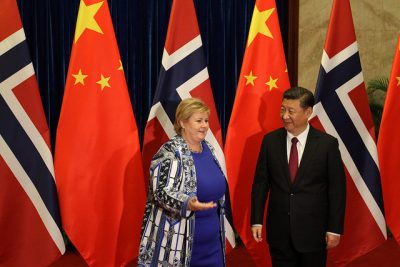Reaction to Chinese authorities’ crackdown on Hong Kong’s democracy continues in Norway, with several top politicians now keen on offering asylum to the former British colony’s pro-democracy activists. One former Norwegian government minister is even calling China “the world’s largest dictatorship.”

“I also think we need to evaluate whether this is a country with which we can enter into agreements,” Trine Skei Grande, outgoing leader of Norway’s Liberal Party, told newspaper Aftenposten.
Grande, who held ministerial posts in the current government and now serves on the foreign relations committee in Parliament, questions whether Chinese authorities can be trusted to respect agreements after “openly defying” the terms of Britain’s Hong Kong handover that were supposed to ensure democracy until at least 2047.
Instead China’s new security laws imposed on Hong Kong are banning demonstrations, severely restricting freedom of expression and a free press, and cracking down on human rights. “When China so blatantly violates the agreement it had with Great Britain,” Grande says, “we must re-evaluate whether this is a country with which we can enter into a free trade agreement.”
She and several other members of the Parliament’s foreign relations committee also support an initiative by its deputy leader, veteran Conservative MP Michael Tetzschner, to offer asylum to those fighting to preserve democracy in Hong Kong. “It’s great that the Conservatives (which lead Norway’s non-socialist coalition government) have realized why we have asylum measures,” Grande told Aftenposten. “I totally agree with him (Tetzschner).”
China ‘dismantling the Rule of Law’
Tetzschner wrote a column in Aftenposten last week arguing that Norway and other democratics countries “should take in intellectual and democracy fighters from Hong Kong and give them asylum on a humanitarian basis.” He referred especially to those who have demonstrated in a non-violent manner and used freedom of expression as a principle in the Rule of Law.
“We can’t take in everyone,” Tetzschner wrote, “but we can cooperate with other Nordic countries and, for example, the EU about such an offer of refuge.”
The British government is already offering residence to pro-democracy activitists who feel as betrayed by Chinese authorities as the British themselves. Hong Kong is thus facing a brain drain as China tries to impose its authoritarian system on the once free and thriving city of 7.5 million inhabitants.

Asked whether offering refuge to Hong Kong residents would sour Norway’s own fragile relations with China, not long after a six-year diplomatic freeze finally ended, Tetzschner told Aftenposten that “what’s soured things is that Chinese authorities are in the process of dismantling the Rule of Law for 7.5 million inhabitants of Hong Kong, in violation with international agreements, not only with Great Britain.”
Tetzschner stressed that “Norway can’t go it alone on this. Our reaction to the changes in Hong Kong’s status must be coordinated with the Nordic countries, the EU and NATO.”
It remained unclear whether Tetzschner was acting at his own initiative or with the support of the Conservative Party, which also has political control over the foreign ministry. It has already declared its concern over China’s new security law in Hong Kong. “We fear that this new law will further raise conflict levels and reduce civilian and political rights and democracy in Hong Kong,” re-stated Marianne Hagen, the Conservatives’ state secretary in the foreign ministry, when asked for a comment on Tetzschner’ initiative. She wouldn’t specifically comment on the asylum proposal, though, since immigration and asylum issues are handled by the justice ministry.
‘Extremely worried’
Foreign Minister Ine Eriksen Søreide of the Conservatives has also repeated how she’s “extremely worried about developments in Hong Kong” and continues to call upon China to reconsider its new security law. She stressed that Norway and 26 other countries have taken up the issue with China, and enouraged the Chinese authorities “to respect the freedom of the Hong Kong people in line with Hong Kong’s Basic Law.”
The foreign policy spokesman for the Conservatives’ former government partner, the Progress Party, stated that he agrees with Tetzschner that Norway can take in dissidents from Hong Kong. “There’s a need for that,” stated Progress’ Christian Tybring-Gjedde in a message to Aftenposten. “At the same time it sends an important political signal.” Progress otherwise champions highly restrictive immigration and asylum policy, so he added that taking in refugees from Hong Kong should result in a reduction of refugees from their countries.

Several opposition parties have long been critical of China’s authoritarian government and support asylum for Hong Kong’s democracy advocates. Anniken Huitfeldt of the Labour Party, who leads the foreign relations committee, stated that she can’t see any reason why the Norwegian government should be less clear about democracy and human rights than other European countries that also support democracy fighters in Hong Kong.
While Chinese authorities have accused pro-democracy demonstrators of terrorism, opponents believe it’s the Chinese authorities who are terrorizing their own people by sending armed forces into the former British colony and, in other areas of China, interning and forcing sterilization on the country’s Uighur minority. Norwegian newspapers have editorialized mightily against such practices, with Dagsavisen accusing China of “a moral collapse” just as it tries to become a dominant world power: “The combination of that should keep all Western democracies and all champions of freedom awake at night.”
Newspaper Aftenposten has editorialized, meanwhile, that the Norwegian government must clearly state its objections to Beijing’s intervention in Hong Kong, after being “embarrassingly careful” in its relations “with the regime in Beijing.” Newspaper Dagens Næringsliv (DN) has editorialized that the “best way of dealing with the Chinese regime is through a united front from all the world’s liberal democracies.” DN urged that it’s “necessary to show respect for China’s right to choose its own course, but also make clear and realistic demands, both regarding trade policy and at least a minimum of respect for human rights.”

Chinese authorities are often quick to claim how they’re highly offended when other countries meddle in their “internal affairs,” but now those same authorities have offended the rest of the free world. The situation in Hong Kong is arguably more than an “internal” matter either. Grande stresses that China has also lost credibility because of its willingness to break the terms of the Hong Kong handover. She and fellow politicians from Denmark, Sweden and Finland expressed their disappointment in China in a joint declaration earlier this month:
“For a long time, China has tried to appear as a defender of a multilateral, rules-based world order. They have supported UN peace-keeping operations, contributed to supporting the UN system … but when China violates the agreement on Hong Kong’s special status, they violate at the same time their own credibility.Unfortunately, under Xi Jinping, China has moved in a more authoritarian direction, both at home and in the world. It’s time for the Nordic countries and the world to meet China as a clear rival.”
Added Grande: “China is clearly a country that can’t manage to hold itself to international agreements.”
newsinenglish.no/Nina Berglund

